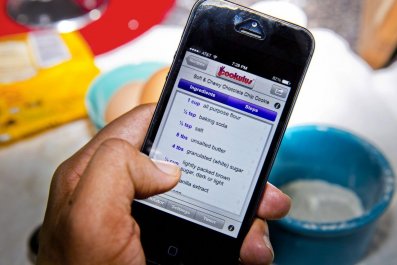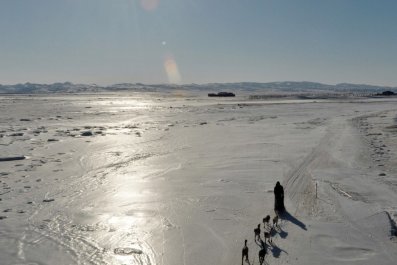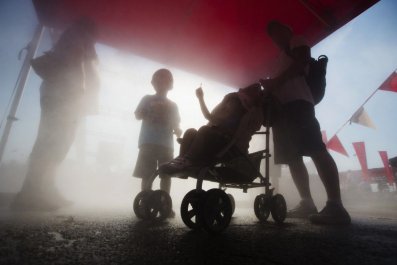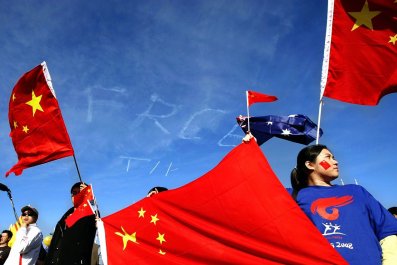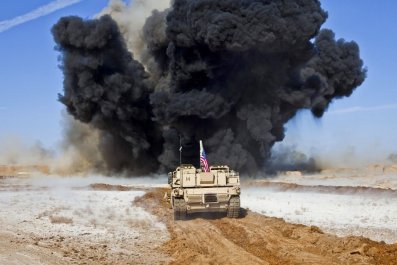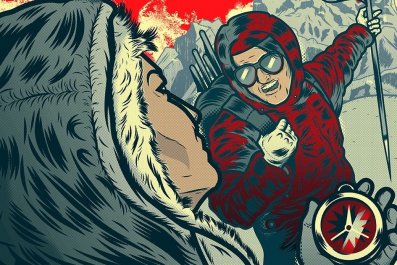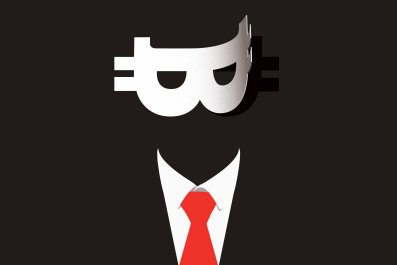"What's a burpee?"
It's 6 a.m. on a freezing morning in Alexandria, Va., a few miles south of Washington, D.C. A group of electrical engineers, computer scientists and math Ph.D.'s from Seagate Technology, the hard drive manufacturing giant, are gathered around a pile of sandbags, looking nervously at a man dressed in black who's just ordered them to do 100 burpees. These people are among Seagate's top talent - the product engineers, managers, programmers, the folks who figure out how to get more terabytes into our computers. The mystified executive who asked the question is slight, bespectacled; he seems like he would definitely be more comfortable pondering the wiring of a hard drive than the proper execution of a burpee. Whatever that might be.
"Who wants to start?" says Mike Hoover with a devilish smile as he quickly demonstrates a correct version: squat, jump to a plank position, do a push-up, back to a squat, then hop up to standing position. Up until two years ago, Hoover ran black ops missions for a covert unit within the United States Army. He spent 25 years hunting Al-Qaeda, the Taliban and a lot of other very bad guys in Afghanistan, Iraq, Bosnia and just about everywhere else they hole up. He has been in the thick of pretty much every dirty fight you've seen in the news - and many you haven't. He was first into Kandahar province, five weeks after the 9/11 attacks, in the first firefight with the Taliban. He doesn't like to identify his covert unit by name, but if you picture, say, Eric Bana's character from Black Hawk Down - that guy street-fighting in Mogadishu - you get the idea.
In no time, Hoover whips the Seagate crew into action - running through a range of physical and mental challenges, from the dreaded burpees to planks to jumping jacks. "That's not a real sit-up," he razzes one soft-bellied exec who is moving sluggishly, using his hands to pull his torso up toward his knees. Almost immediately, the guy picks up his pace, bobbing up and down faster and faster. At one point, one woman, wincing after a set of push-ups, looks like she might quit. Instead, she takes a minute and then throws herself right back into the drills. "I took some Advil this morning," she gasps.
These executives don't look like soldiers, but they aren't going to roll over. In one drill, called Down-to-One, Hoover has the team set up sandbags in a triangular formation. They must move the bags, one by one, off a tarp, following specific instructions. It is essentially a life-sized math puzzle involving 350 pounds of sand, and this crew of engineers and computer whizzes - clearly more familiar with numbers than jumping jacks - attack it enthusiastically. Some of the larger guys immediately start lugging the 25-pound bags, confident they can solve the puzzle quickly. Others stand to the side, quietly observing. They occasionally make suggestions, but none of the guys hauling bags seem to hear. It soon dawns on them, however, that what at first looked to be an easy task is actually a complicated problem. After several attempts and many sandbags hoisted, dropped and then hoisted again, the group is stumped. They need a new strategy. The guys hauling bags stop to listen to those on the sidelines; they huddle up, talk through their tactics; coordinate their moves; and a few minutes later, the puzzle is solved. They have become a team.
Hoover, watching, smiling, says, "That's the whole point."
Hoover is part of an elite team of ex-Navy SEALs, black ops, spies and other combat vets who form the McChrystal Group. Their co-founder (and name on the door) is retired general Stanley McChrystal, the guy who used to run the war in Afghanistan, and before that ran covert operations for the U.S. military. Now, his band of ex-commandos and spooks are training corporate America to fight in business the way they fought Al-Qaeda.
Later that morning, as the Seagate crew heads to the showers, one of the managers, reflecting on what they'd done that morning, says, "I think this could really help us. I think that what they went through in Afghanistan is a lot like what we are going through now."
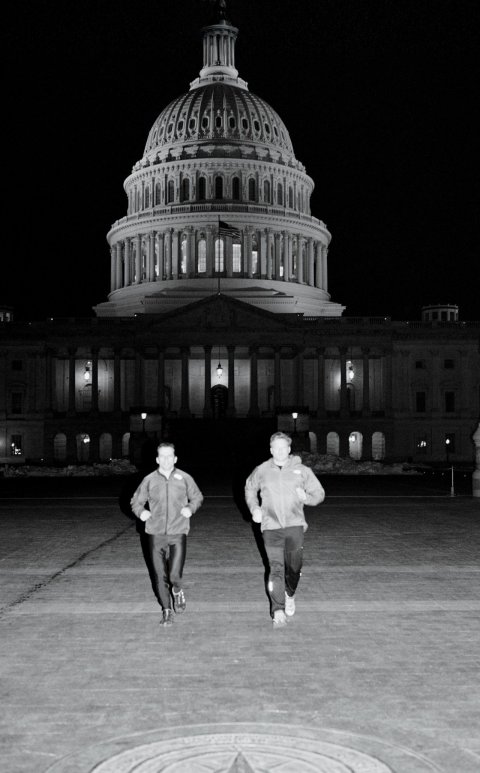
Al-Qaeda Was Like Napster
"We started at my kitchen table," says McChrystal, the man Newsweek once described as "a very effective killer." He's explaining how this crew of Al-Qaeda hunters ended up in the corporate world.
Three years ago, the general found himself out of a job after President Obama recalled him from Afghanistan over a Rolling Stone profile entitled The Runaway General. The article, which generated headlines around the world, pitted him against the White House. It quotes his staff insulting members of the president's. (One aide referred to Vice President Joe Biden as "Bite-me.") The media fall-out was so disastrous that it is now the subject of an Army War College case study. Suddenly, after 34 years in the military, the four-star general was unemployed and trying to figure out what to do next.
"It was the morning after I had retired and we gathered some friends," says McChrystal. One of his ex-Navy SEALs, David Silverman, who used to help him run raids in Iraq and Afghanistan, had an idea for starting a business. He wanted to take all that they'd learned fighting Al-Qaeda and the Taliban and apply it to the corporate world. McChrystal and Silverman talked about how fighting a new kind of enemy forced them to rethink everything. "Al-Qaeda was radically different: It had no center of gravity, it morphed, it changed, it was really hard to predict," says Silverman, who is McChrystal Group's co-founder and chief executive officer, in charge of day-to-day operations. "[It] was like Napster to the music industry."
In other words, Al-Qaeda is to the U.S. military what the Internet, mobile technology, the cloud, Google are to American business: fast-moving, tech-savvy, unpredictable and capable of disrupting, even destroying, a well-established industrial-age organization. The ex-general and the ex-SEAL came up with a business plan, recruited some of their ex-black ops teammates and started looking for clients.
Since the company officially opened its doors in 2011, a steady stream of top executives, from Wall Street to Silicon Valley, have hired McChrystal to train their troops. Already, Seagate has sent some 500 executives through McChrystal's training and plans for another 1,500 top managers to cycle through. The physical drills (burpees, others) are but a part of a much larger strategic plan laid out for companies who hire the firm. Simply put, what the McChrystal Group is selling is a blueprint of how they used to hunt Al-Qaeda - repackaged into something it hopes corporate America can implement. Using tactical training sessions, war-room action plans and one-on-one coaching, the firm has, effectively, come up with a step-by-step tutorial on how to do what they did: fight a digital age war.
For these big companies, the stakes may not always be life and death, but they are high. "The game we honed for, that game is over," says Seagate Chief Financial Officer Patrick O'Malley, who ran laps in a parking lot as part of his training at McChrystal. "If you believe the naysayers, the desktop and the notebook will disappear in five years."
Seagate's situation is, in many ways, emblematic of what so many companies are going through right now. Over 95 percent of its revenues come from selling hard drives to computer manufacturers like Dell and Hewlett-Packard. Now iPads, tablets, cell phones and Google Glass are threatening that entire market. Personal computer sales dropped 10 percent last year, after seven straight quarters of decline - and they will keep dropping. If your biggest customers are disappearing, you either adapt or die.
But getting big, industrial-age corporations to change fast enough to keep up in the digital age is hard. And here, for many "old economy" executives, is where McChrystal comes in. "We looked at what [McChrystal] had done in changing the military structure; it was essentially the same things we needed to do," says Barry Sanders, president and chief operating officer of Scotts Miracle-Gro, which sells lawn products, and hired McChrystal to train 1,000 employees. It also built a corporate war room at its Ohio headquarters modelled on McChrystal's command center in Afghanistan. "How did he get not only the U.S. Army to change but all the other agencies as well? How did he fix what was losing the war on terror?"
The story of how Stanley McChrystal overhauled black ops is, in military circles, legend. Books, articles, case studies have been written about how he transformed the U.S.'s Joint Special Operations Command (JSOC) from an industrial age bureaucracy into a sleek, digital, Al-Qaeda-hunting machine. "It was McChrystal who took the special operations Ferrari out of the garage and drove it to become a killing machine of unprecedented agility and ferocity," says Peter Bergen, award-winning war correspondent, in his book Manhunt: The Ten-Year Search for Bin Laden from 9/11 to Abbottabad. "Under McChrystal, JSOC would become the adaptable, innovative counterterrorism organization that Top Secret America was supposed to be," say Washington Post reporters Dana Priest and William Arkin in their book, Top Secret America: The Rise of the New American Security State. "He achieved this only by outright rejecting at least four of Top Secret America's defining characteristics: its enormous size, its counterproductive duplication, its internal secrecy and its old-fashioned, hierarchical structure."
When McChrystal took over JSOC in 2003, it was a sprawling umbrella organization that linked over a dozen government agencies, from the CIA to the Navy SEALs to the FBI. Each agency worked in a silo and deeply mistrusted the others; nobody liked sharing anything - information, people or technology. They did not even share an email system and could not send each other messages quickly or reliably. One agency used police tape to cordon off a corner of the central command center in Iraq, physically blocking access to its people and equipment. It would take days for information to pass from one agency to another. All this made JSOC slow - dangerously slow. The elite force found itself out-maneuvered by an enemy with far less training, less money, and using technology you could buy at RadioShack.
"We were losing the fight," says McChrystal, who wrote a memoir last January and also teaches a course at Yale on his combat experiences. "We didn't want to admit that but we were."
"There was a particular Taliban leader," recalls Chris Fussell, an ex-Navy SEAL who ran missions for McChrystal in Afghanistan and Iraq, and is now director of business development at the McChrystal Group. "He couldn't have written a paper on our approach, but he knew enough to stay one step ahead," recalls Fussell. "Forty-eight hours later, you realized, 'Oh, we just missed him.' ...When we went back and deconstructed it, you could see that everybody had the right information but because on our side the organization wasn't structured to open the lines of communication effectively in real time, we couldn't get ahead of the next move of the people we were trying to find."
The silos created other problems. For example, if a SEAL team captured an operative, they usually confiscated cell phones and laptops loaded with contacts and other valuable information - but had to send them back to Washington to be analyzed by the CIA or NSA. By the time any information pulled from those devices got back to the field, it was often outdated.
"As a young officer, it is very frustrating," recalls David Silverman. "My tour in Iraq in 2005, 2006 - early on, we got a target list by the higher powers that said, 'This person is a bad person, you should take out the bad guy.' We planned, executed and were able to capture this person and turn him into the judicial system for prosecution. And then, literally five months later, the same target package ends up on my desk again. I said, 'Wait a minute, I just risked life and limb to go find this guy.' "
McChrystal pushed for radical, wholesale change. Under his command, agencies that mistrusted and despised each other began collaborating in ways that were once unthinkable. For example, Delta Force and the Navy SEALs - who were historical rivals in black ops - began executing joint raids. He got the CIA and NSA to open up their information systems, and sent one of his most senior intelligence officers to be the CIA's liaison. He overhauled the communications platform, increasing the bandwidth capability of JSOC's system a hundredfold. He linked all the agencies operating around the world, allowing operatives everywhere from, say, Kabul to Manila to Djibouti to communicate via live video conference. That meant an intelligence analyst in D.C. could watch a special ops team execute a raid in real time - and instantly analyze, say, data from a seized cell phone.
The results were extraordinary: Missions that once took days to plan and execute now took hours. McChrystal says that between 2004 and 2006, the number of missions executed by special ops in Iraq, for example, in one month rose from less than 20 to nearly 300. They were now capturing Al-Qaeda and Taliban operators who'd long eluded them, and doing it faster and more efficiently. This new, sleeker, high-tech version of special operations is what ultimately tracked down and killed Osama bin Laden.
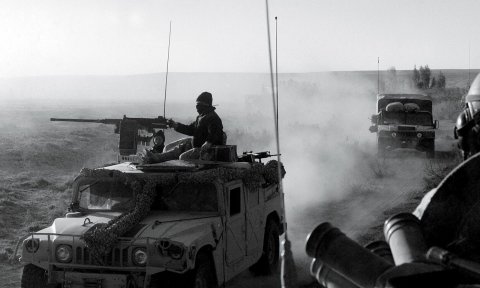
From "Killing It" to Dead in the Water
It is late morning in Alexandria, and a group of Seagate's product line managers are sitting at long tables set up in a large semicircle, listening, rapt, to, well, war stories. "Al-Qaeda...they were really good at leveraging chaos to their advantage," David Silverman tells them, standing at the front of a room designed to replicate the U.S.'s Afghan command center - open, so you can see everyone in the room from wherever you are. Behind Silverman is a large flat screen showing two diagrams, one of the organizational structure of the U.S. military, the other of Al-Qaeda's. The first diagram is a neat, linear, pyramid - easy to follow; the latter is a tangled, messy web.
"To put it in parlance that is similar to what you guys see, [Al-Qaeda] was like the dorm room kid coming out of Stanford, whose disruptive technology is going to change storage." Silverman continues. "We were stuck in a system that required us to do things by certain rules and regulations." This is no typical corporate offsite: every manager in the room is listening, riveted. Most of them will never experience anything like what McChrystal and his men did in Afghanistan and Iraq. As Silverman talks, murmurs ripple through the room, one manager catches his colleague's eye, sending a silent message. It is clear that something here resonates. Later, one of the managers explains: "It feels like what we are up against."
To understand what Seagate is facing right now, it is important to remember this: It won the last war. For the past three decades, the company honed and perfected a business strategy that has succeeded in selling a lot of hard drives - 2 billion last year. With $14 billion in sales, Seagate now controls more than 40 percent of its market and is among the last three still standing in an industry that once had dozens of competitors. Trouble is, that war - the one to sell the most hard drives - is over. "When I joined here two years ago, people were talking about companies that were 'killing it' that don't exist anymore," says Kate Scolnick, vice president of investor relations. Nearly every day there are news stories about how the demise of personal computer industry. And while it's unlikely hard drives will disappear in the immediate future, cloud technology and the soaring demand for mobile technology are bringing daunting changes to their world.
To keep from going the way of Kodak and BlackBerry, Seagate is in the midst of an extraordinary transformation: It is revamping a strategy that worked pretty well for 35 year for something new and untested.
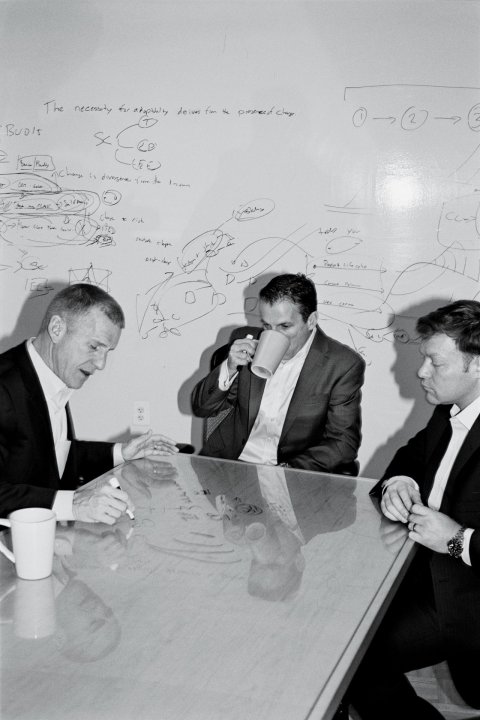
Over the past 18 months, Seagate has begun incorporating McChrystal's special ops tactics to help transform almost everything about the way it does business. Just as the general's strategy in the field made his team faster and better at capturing bad guys, Seagate is hoping to get faster and better at selling storage. For example, in the same way McChrystal pushed the NSA to work with the Navy SEALs, the company is now pushing its divisions to collaborate on ideas, new products, new deals, new revenue streams. The idea is if, say, the finance guys know what the engineers are up to, they can help them move a product down the line faster. "I totally reorganized my finance team - they sit at the hips of our cloud folks," enthuses O'Malley.
The cloud is both Seagate's enemy and its possible salvation: By 2017, businesses will grow their cloud-related spending to $235 billion, three times what it was in 2011, according to a report by IHS, a market research firm. The company is hoping to find ways to capitalize on the emergence of this huge new market. It is looking at how companies like Facebook and YouTube are using huge amounts of storage - all those selfies and cat videos take up a lot of bytes. Ideas that would have been laughed down just a few years ago now get serious consideration. Recently, for example, the company has started looking at the potential market for leasing storage - as a way to target, say, start-up social media firms. "We are literally playing around with multiple different business models to see what works for us," explains O'Malley.
For managers on the front lines of this war, the impact of the training is clear. "It was one of the most powerful experiences I have had in the corporate world," says Scolnick, who says she has seen palpable changes in her own group already. For example, she notes that, recently, the finance department came to an impasse with the IT team over how to upgrade its technology platform. Normally, this kind of problem would get punted around back and forth endlessly. This time, instead, the department heads met, talked out the issues and came up with a plan to move forward. Scolnick says, this would have never happened prior to their training at McChrystal. One product manager recalls a recent incident where he was brought in to help with a customer who had a particular product issue. "It took us 10 minutes to come up with a solution that normally would have taken three weeks to get to," recalls the manager. "And by that time, the opportunity might be gone."
Whether or not McChrystal's training will ultimately help win the cloud wars is not yet clear--the Seagate is still in the midst of its overhaul. Another customer, Scotts Miracle-Gro, says it has already seen the result of McChrystal's training: it credits the firm with helping it grow earnings per share last year by 39 percent. The company used tactics taught by McChrystal's people to help it react quickly to an unexpected cold snap last spring, revamping its marketing strategy and manufacturing schedule to be able to sell its lawn products later in the season. Scotts also credits McChrystal's team with helping it fight off a YouTube attack ad that a smaller, regional competitor launched against them.
For his part, McChrystal says he has learned a lot from the corporate world. Clients love the war stories, but they like profits even more. There are naysayers who are not easily convinced that knowing how to bust up Al-Qaeda cells will help sell more lawn seed or hard drives. His team now fights for every dollar it earns against the likes of McKinsey and Bain - who may not be the Taliban, but they will ferociously defend their territory. Says McChrystal: "Business is exactly like war."




